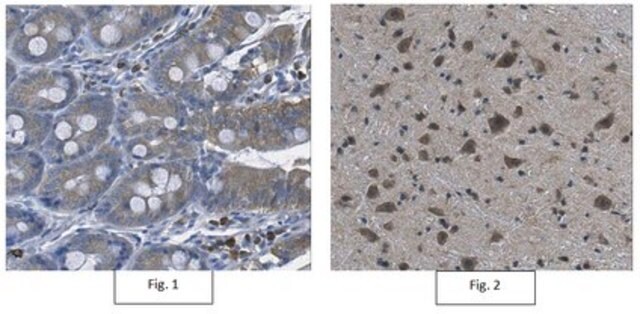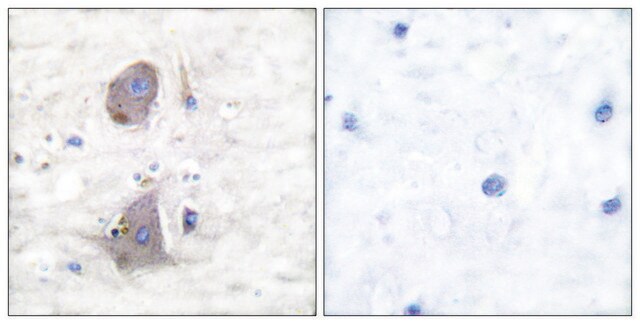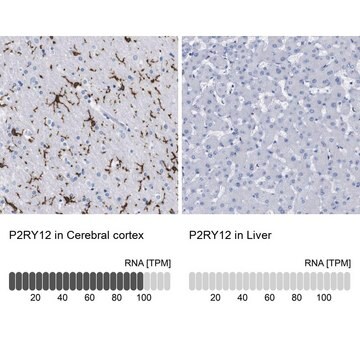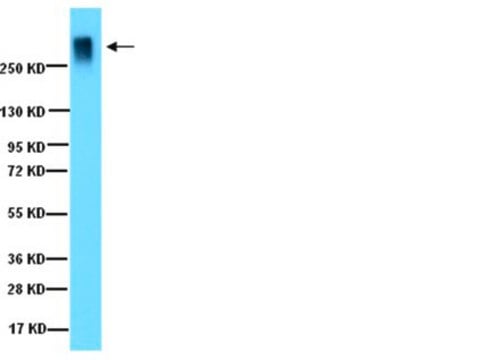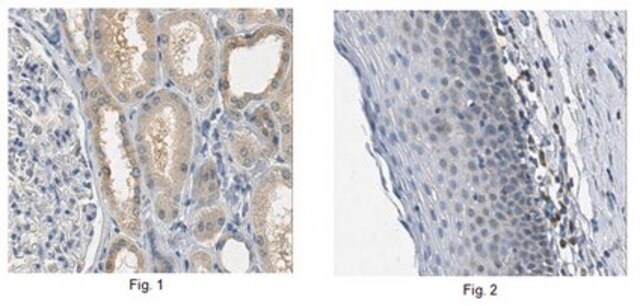おすすめの製品
由来生物
rabbit
品質水準
抗体製品の状態
affinity isolated antibody
抗体製品タイプ
primary antibodies
クローン
polyclonal
精製方法
affinity chromatography
化学種の反応性
mouse, human
化学種の反応性(ホモロジーによる予測)
rat (based on 100% sequence homology)
テクニック
immunohistochemistry: suitable
western blot: suitable
NCBIアクセッション番号
UniProtアクセッション番号
輸送温度
wet ice
ターゲットの翻訳後修飾
unmodified
遺伝子情報
human ... SLC2A4(6517)
詳細
The protein called GLUT-4, or more correctly Solute carrier family 2, facilitated glucose transporter member 4 and encoded by the human gene SLC2A4/GLUT4 is a primary insulin regulated facilitative glucose transporter found primarily in skeletal and cardiac muscle, as well as brown and white fat but is also expressed in other tissues such as brain. In the brain GLUT4 is found exclusively in neurons. GLUT-4 is facilitative because it is not always present on the cell plasma membrane. GLUT-4 only localizes to the plasma membrane upon insulin induction. GLUT-4 is localized to the perinuclear region in resting cells. Mutations in GLUT-4 are a cause of one form of non-insulin dependent diabetes mellitus. GLUT4 function as well as its transcriptional regulation is highly conserved throughout the vertebrate species.
特異性
Glucose transporter 4 (GLUT-4) is a protein present in rat skeletal muscle, heart and adipose tissues. GLUT-4 is highly conserved between species, and the peptide sequence selected for production of this antibody is identical in rat, human (amino acids 498-510), and mouse. This antibody shows no cross-reactivity of HepG2 type transporter from rat brain or other glucose transporters.
免疫原
Epitope: C-terminus
KLH-conjugated linear peptide corresponding to the C-terminus of human GLUT-4.
アプリケーション
Research Category
細胞シグナル伝達
細胞シグナル伝達
Research Sub Category
インスリン/エネルギーシグナル伝達
インスリン/エネルギーシグナル伝達
Detect GLUT-4 using this Anti-GLUT-4 Antibody, C-terminus validated for use in WB, IH(P), ELISA.
Immunohistochemistry Analysis: A 1:50-2,000 dilution from a representative lot detected GLUT-4 in human cardiac myocytes and human skeletal muscle myocytes.
品質
Evaluated by Western Blotting in NIH3T3 cell lysate.
Western Blotting Analysis: A 1:1,000 dilution of this antibody detected GLUT-4 in 10 µg of NIH3T3 cell lysate.
Western Blotting Analysis: A 1:1,000 dilution of this antibody detected GLUT-4 in 10 µg of NIH3T3 cell lysate.
ターゲットの説明
~58 kDa observed
関連事項
Replaces: AB1346
物理的形状
Affinity purified
Purified rabbit polyclonal in buffer containing PBS with 0.05% sodium azide.
保管および安定性
Stable for 1 year at 2-8°C from date of receipt.
アナリシスノート
Control
NIH3T3 cell lysate
NIH3T3 cell lysate
免責事項
Unless otherwise stated in our catalog or other company documentation accompanying the product(s), our products are intended for research use only and are not to be used for any other purpose, which includes but is not limited to, unauthorized commercial uses, in vitro diagnostic uses, ex vivo or in vivo therapeutic uses or any type of consumption or application to humans or animals.
適切な製品が見つかりませんか。
製品選択ツール.をお試しください
保管分類コード
10 - Combustible liquids
WGK
WGK 2
適用法令
試験研究用途を考慮した関連法令を主に挙げております。化学物質以外については、一部の情報のみ提供しています。 製品を安全かつ合法的に使用することは、使用者の義務です。最新情報により修正される場合があります。WEBの反映には時間を要することがあるため、適宜SDSをご参照ください。
Jan Code
07-1404:
試験成績書(COA)
製品のロット番号・バッチ番号を入力して、試験成績書(COA) を検索できます。ロット番号・バッチ番号は、製品ラベルに「Lot」または「Batch」に続いて記載されています。
Pascaline Aimé et al.
Frontiers in behavioral neuroscience, 8, 326-326 (2014-10-04)
The Zucker fa/fa rat has been widely used as an animal model to study obesity, since it recapitulates most of its behavioral and metabolic dysfunctions, such as hyperphagia, hyperglycemia and insulin resistance. Although it is well established that olfaction is
ChREBP, a glucose-responsive transcriptional factor, enhances glucose metabolism to support biosynthesis in human cytomegalovirus-infected cells.
Yu, Y; Maguire, TG; Alwine, JC
Proceedings of the National Academy of Sciences of the USA null
Dolly Al Koborssy et al.
Frontiers in neuroscience, 8, 333-333 (2014-11-18)
In the brain, glucose homeostasis of extracellular fluid is crucial to the point that systems specifically dedicated to glucose sensing are found in areas involved in energy regulation and feeding behavior. Olfaction is a major sensory modality regulating food consumption.
Doxorubicin Induces Inflammatory Modulation and Metabolic Dysregulation in Diabetic Skeletal Muscle.
Rashmi Supriya et al.
Frontiers in physiology, 7, 323-323 (2016-08-12)
Anti-cancer agent doxorubicin (DOX) has been demonstrated to worsen insulin signaling, engender muscle atrophy, trigger pro-inflammation, and induce a shift to anaerobic glycolytic metabolism in skeletal muscle. The myotoxicity of DOX in diabetic skeletal muscle remains largely unclear. This study
Insulin and insulin-like growth factor I up-regulate GLUT4 gene expression in fetal brown adipocytes, in a phosphoinositide 3-kinase-dependent manner.
Valverde, A M, et al.
The Biochemical Journal, 337 ( Pt 3), 397-405 (1999)
ライフサイエンス、有機合成、材料科学、クロマトグラフィー、分析など、あらゆる分野の研究に経験のあるメンバーがおります。.
製品に関するお問い合わせはこちら(テクニカルサービス)